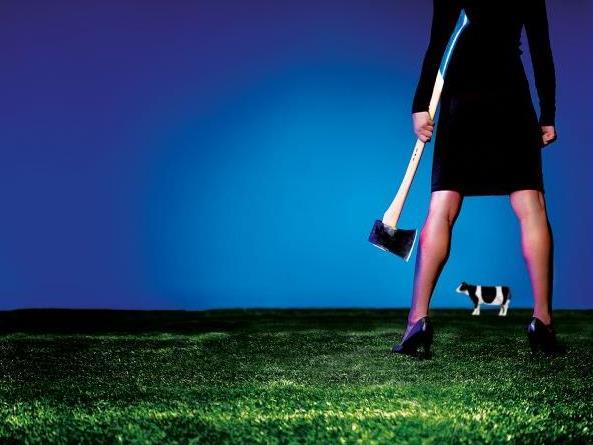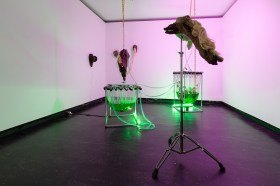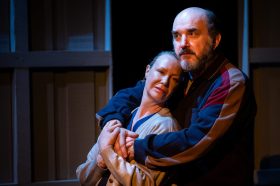‘More Beasts, less restoration comedy’: Image from the MTC production of The Beast (2013).
Why is Australian playwriting becoming an endangered species? And does it matter?
I think it does matter for the reason that the great ability of our sharpest playwrights is that they have an extraordinary ear for the social and political realities of the moment, and for the direction of the trends into the future. At their best they can articulate, before the rest of us, what is going wrong or right with our society and why. It’s a hugely important source of information about ourselves and if we kill it off by using stories from other cultures and other times, then we are killing of possibly the most exciting and penetrating truths about ourselves. Truths that we sorely need.
The reason that classics, and books and films are increasingly being utilised by our major companies was articulated by Simon Stone. That the stories have been tested and we know they work.
It’s risk aversion but often misplaced risk aversion. Although the tried and true stories tell us truths about general human nature they are not honed in with any sharpness on the questions about ourselves we need addressed right now. Any good play will contain universal truths about humanity in general but it will also contain specifics, and important specifics about us, in the here and now.
Flaubert once said that all great art was provincial. The universal truths are important but it’s the specifics of time and place and the accuracy of those specifics that bring a work to life.
I have so often been bored witless, praying for plays to end, when that old hoary classic is trotted out and tarted up yet again. My inner self is crying out “tell us something bold and strong about us in the here and now for god’s sake.”
Risk aversion is one of the huge factors decreasing exciting new Australian work. The proportion of arts subsidy both state and federal the major companies receive is down to roughly eight or nine percent. In the seventies and eighties it was up near forty percent. Most state companies have retreated in the face of this decrease and program upper middle class crowd pleasers like Noël Coward, Oscar Wilde, Neil Simon and Shakespeare, and obligatory if tired cultural icons.
Well I’m sorry. Noël Coward’s legendary wit has paled massively for me. I think the longest night in the theatre I ever spent was watching a recent production of Waiting for Godot. It might have seemed brilliant for Sam Beckett to dispense with plot and give us dated philosophical chattering for three hours, but even superb acting could not prevent time standing still for me. Beckett thought the greatest problem humanity faced was staving off boredom and he certainly did confront me with that problem in a very acute fashion that night.
But there is another way of attracting audiences for the major companies. It’s to program polished incisive plays about our here and now and draw patrons by the excitement of what they may see, rather than the cultural kudos of being bored by Beckett. And to my knowledge there is only one major company pursuing such a policy. And that’s the Melbourne Theatre Company which contains as its engine room Brett Sheehy and Brett Sheehy’s appointee Chris Mead.
What other state company would have been game enough to program, from a rough draft, a story about slaughtering a beast onstage and have characters slipping and sliding in blood? And it was a huge hit.
There are other factors causing the decrease of new writing. It’s not just the small proportion of funding going to theatre companies; it’s the absurdly small proportion of funding going to first line Australian creativity.
Massive amounts of taxpayer’s money flow to opera and ballet and state theatre companies to reproduce and reinterpret a dwindling stock of tried and true crowd pleasers. An endless recycling of Mozart and Verdi and Swan Lake and a handful of others. Even Bell Shakespeare finds that only six of the bard’s plays reliably deliver box office. It’s a huge amount of taxpayers’ money to prove we can reproduce that valiant handful almost as well as they can at Covent Garden or the met.
Senator Fifield, could I implore you to seriously look at the dividend you might get in terms of a future exciting national repertoire of pertinent drama, if we were to divert some of that massive expenditure on lavish reproductions of other culture and other times to creating a lasting and vivid picture of our own culture and our own times.
It is a serious travesty that the only remaining theatre company devoted to exploring new Australian work, and doing it brilliantly, the Griffin in Sydney under the wonderful Lee Lewis, operates on a shoestring subsidy.
Any government still not sorely afflicted by the still present and strong Australian cultural cringe would realise what a wonderful cultural dividend we would harvest if we had two competing Griffin Theatre Companies in every state, searching for the most exciting new work they can.
And if the private sector could divert just a little of their funding from sport and opera and ballet and state companies to say fund auxiliary arms of our state theatre companies to not just find, but develop and hone the skills of our best writers, to enable their scripts to reach the levels of polish which will immediately make audiences recognize that a new voice has arrived. Too many potentially fine plays bite the dust here because lack of development funding and lack of input from theatre professionals causes them to his the stage born prematurely. We don’t have the extended tryouts that hone US and UK plays. Here it’s sudden death, sink or swim.
The United States and the UK also have a strong culture of leaning to the playwrights of their nations to deliver prescient messages that impact on a nation’s awareness of itself. We have no such thing. There is still at the back of the minds of many of our cultural czars the belief that, in the words of one of my characters in my play emerald city, “that real life happens elsewhere and is spoken in accents other than our own.”
To those cultural gatekeepers it’s time to grow up. We have a culture that’s as interesting and complex as any in the word and the writing talent to explore it.
But it’s unwise to blame all the problems of Australian playwriting on all but ourselves. The death of theatre in the face of new technologies has often been proclaimed and never happened but I do think the form is under greater challenge than ever.
The basic craft of writing, to me is effective storytelling. Whether the form be wild satire or realism. At the heart of great drama there have to be two elements. Accurate and incisive characterisation and dramatic momentum.
Too many of us forget the simple dictum of the American playwright David Mamet that audiences come to plays to see “what happens next”. If I have one criticism of some of the drama I’ve seen is that writer often seems entranced by character and dialogue, but a lack of dramatic momentum leads the play towards becoming a character study rather than a gripping piece of drama.
I bring this up because the competition is now fierce. In particular American cable drama has reached a high point of storytelling skill that needs to be matched. I confess I have spent much more time watching all seven series of the west wing, much of The Sopranos, all of Madmen, much of The Wire, much of House of Cards and others than I have plays in our theatres.
So brilliantly has quality TV mastered dramatic momentum is that the greatest health hazard I’ve recently faced is staying up until two every morning watching episode after episode because you can’t bear not to know what happens next. And it’s not just entertainment. It’s often profound comment on the contemporary society we live in. And it has huge storytelling advantages over the stage. Now we see the characters up close on huge screens in our own living rooms. The camera takes us effortlessly to new locations stunning in their ability to add atmosphere to the story. The close up on a face in our living room transports us.
The sheer distance of stage performers as tiny specks on a distant stage in a huge theatre never used to worry me as much, but now my mind keeps crying out for the close up, the pan of the landscape. Cinema also has offered increasing impactful independent movies as further competition. I sit down near the front of the cinema and am swept away.
The only way we theatre writers can compete with that is to offer polished, contemporary work that is equally exciting because it offers contemporary insight specific to us and our circumstances, with the impact and excitement that can match the might of great TV and film drama.
And unless we’re talking huge cast musicals or theatrical extravaganza, smaller more intimate theatres are the way to go. Not thousand seat mausoleums with that deadly eternal longshot.
And the situation has been made even worse by the high quality productions from the National Theatre of Great Britain projected brilliantly on huge screens featuring the best actors and directors in the world in brilliantly shot close up. In many ways its better than being there watching tiny figures from a great distance in the vast Olivier Theatre.
If I was a Minister of the Arts and I wanted to enrich this society by making sure that the prescient brilliance of our playwrights enriches us all, I’d rip down the mausoleums and replace them with multi-stage multiplexes like the cinema does. I’d fund at least three small energetic companies devoted to the development of new work like the Griffin and let them compete within these spaces for audiences. And I’d give tax incentives to corporate sponsors to fund development wings of theatre companies to bring expert dramaturgical skill to the aid of our most promising playwrights.
Make no mistake. Theatre is under genuine pressure from increasingly sophisticated and expert competition from the large screen in its various forms. But it would be a tragedy if the wonderfully insightful voices in this room were not able to inform us about ourselves.
In order to make this happen my suggestions would be:
To state theatre companies: please realise that more excitement can be generated by our own stories powerfully told that yet another Noël Coward. More Beasts, less restoration comedy.
To governments: please realise that you’re pouring vast sums of money into a repertoire of classics getting increasingly narrower and more boring, instead of helping make us a more insightful and interesting culture by diverting much more money into prime creativity rather than interpretive creativity.
To corporations: stop pouring all your money into sport and polite museum theatre. Make something truly interesting happen in this country by putting money into funding the staging of new work or even more importantly into developing it.
To architects, stop giving us mausoleums fit only for huge and extravagant musicals and give us functioning theatrical multiplexes for drama. Intimacy is the way of the future.
And to playwrights: remember the big screen competition is enormous and growing apace. Demand effective dramaturgical help to make sure your career isn’t cut short by your play hitting the stage too early. Don’t let your work be staged in a vast mausoleum unless it’s a musical or an epic, and be it satire or realism, don’t get carried away by your love of dialogue or character. Audiences really do want to be on the edge of their seats wondering what is going to happen next.
This article is based on a speech delivered to a dinner of 70 Australian playwrights hosted by Carrillo and Ziyin Ganter on 26 July at Arts Centre Melbourne.





